
By: Stephanie Spies, CFP
When you think of collectibles, the first things that may come to mind are your baseball card collection, the Persian rug in your living room, or the 1967 Ford Mustang in the garage. While these items may have sentimental value, they may also have monetary value.
If you are a collector, here are a few things you should consider:
Insurance Considerations
Two of the main risks with collectibles are the potential for theft, or damage resulting from an event such as a fire or flood. Since many collectibles are stored in your home, it is often assumed that they are covered under homeowners or renters insurance policies. However, this is not always the case. Many of these policies contain exceptions or low limits for collectibles and valuable items. For example, a traditional homeowners policy may limit coverage to $1,500 for artwork. Certain items such as memorabilia may be ineligible for replacement cost coverage, meaning that you will only receive the amount that you paid for the memorabilia and not what it is currently worth.
Based on the type of item and its value, a valuables rider or a separate valuables policy may provide sufficient coverage for your items. Some insurance companies may require an appraisal based on the perceived value. There are even some carriers that focus specifically on insuring collectibles if coverage is not available through your current carrier.
Tax Planning Considerations
At some point, you may decide to sell a collectible. If you do decide to sell, there may be tax implications:
- If you sell an item for more than you purchased it for, you have a capital gain.
- The tax rate for capital gains on the sale of collectibles may be higher than your personal tax rate on other capital gains, such as gains from investments.
- If the item has been held for more than one year, the capital gain tax rate is 28%1.
- If the item has been held for less than one year, it is subject to taxation at ordinary income rates.
- If a collectible is now worth less than the amount you paid for it, you may have a capital loss. However, this type of capital loss is often not deductible for Federal tax purposes.
- There may also be additional tax implications at the state level.
Estate Planning Considerations
Your estate planning documents provide instructions on how your assets will be divided upon your passing, including your collectibles. There may be emotional implications to dividing your collection as part of your estate plan. As a collector, you may be passionate about the collection you have built and maintained over the years.
Your intentions may be to pass your collection on to your family members or friends with the intention that they continue to maintain it in the future. This could be a great fit if your heirs have an interest and share your passion. There may also be ongoing costs to consider, such as storage costs for a vehicle, or insurance considerations as mentioned earlier.
If you choose to leave a collection to one heir, there could be an unequal estate distribution. This could cause complications and tensions among your heirs, even for items that do not have a large monetary value but are sentimental.
You may instead choose to instruct your executor to sell the collection, and provide guidance around seeking counsel from a dealer, or require an appraisal before the collection is sold. You can also consider donating your collection to a museum or a charity. If this is an option you would like to pursue, it may require additional planning and coordination in advance.
To ensure that your wishes are met, and your intentions are better understood, you may want to share your goals with your family in advance (in addition to the instructions in your estate plan). This can help to better inform your heirs and lessen the probability that there are surprises and tension in the future.
So, whether you collect baseball cards or Basquiat’s paintings or anything in between, it’s important to understand some of the financial implications involved. We can assist you in coordinating with your insurance agent, tax preparer, or estate planner to ensure that you have all the financial boxes checked. We’re happy to help you keep your assets protected and aligned with your overall objectives.
Collecting Collectibles? Consider This


